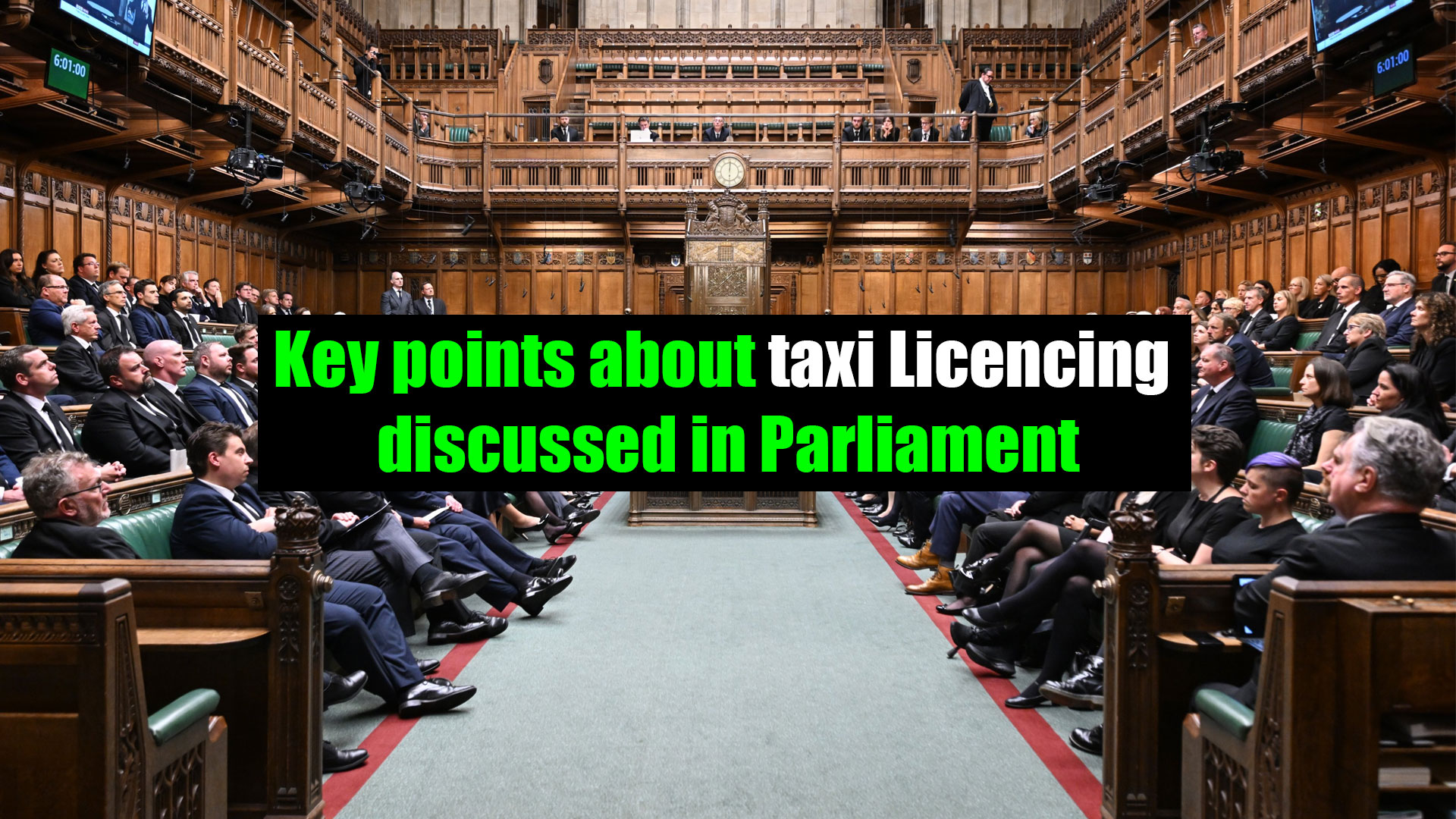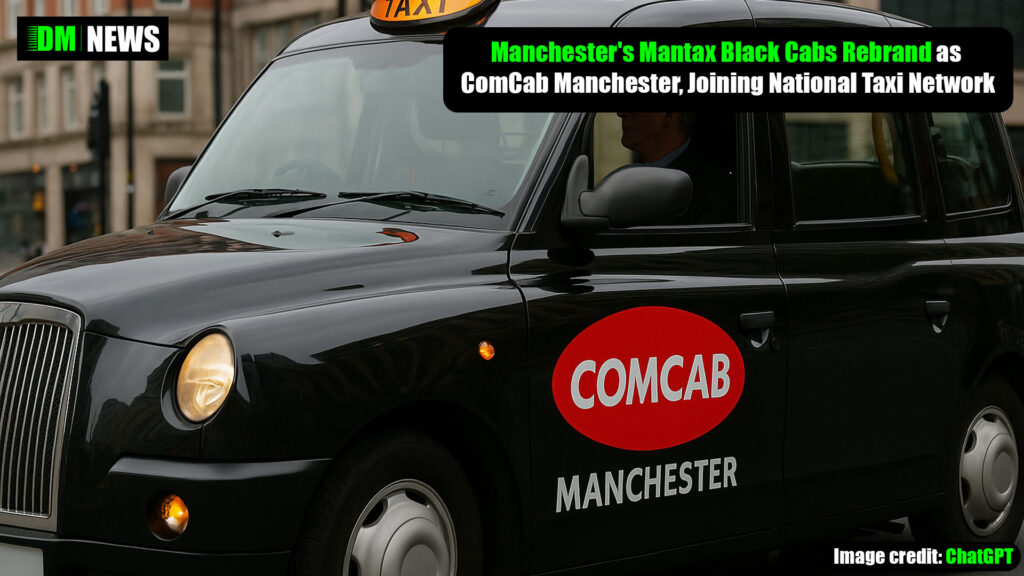Last night, October 21st, 2024, the UK parliament discussed the issues with current taxi licensing regulations, the Deregulation Act, cross-border hiring, and out-of-town drivers. Some points were positive regarding current rules, and some were against them. Below, DM News has selected a few key points from the discussion.
I have sought this debate to bring attention to the growing dangers fostered under the current system. The 2015 Act has opened a loophole, allowing private hire drivers to license their vehicle in district authorities far from where they operate. In practice, this means that drivers are no longer bound by local standards. Instead, they can shop around for the cheapest licence anywhere in the country, then return to work wherever they choose. Harlow has long had the gold standard for its taxi services—standards that our local drivers proudly meet. Why is that? It is because they know, as I do, that nothing is more important than the safety of their passengers.
I absolutely agree with my hon. Friend that the principle should be that drivers should be licensed by the local authority for the area in which they are operating.
Cross-border hiring is undermining high standards, and it strips councils like Harlow of the power to oversee and enforce proper regulations. A driver who loses their licence in one district can simply apply for a licence elsewhere and continue operating with little or no scrutiny. Local authorities lack the enforcement powers to police out-of-town drivers, and that leaves a gaping hole in our public safety framework. How can we claim to protect our constituents, when such fundamental weaknesses exist in our system.
My hon. Friend is right; this is not just a bureaucratic oversight, but a public safety crisis waiting to happen. Vehicles are not being inspected regularly enough and drivers are not being vetted thoroughly enough. Passengers, who trust that any taxi they step into is safe, are the ones left exposed. Taxis often serve the most vulnerable members of our community. Can we truly say that we are doing our duty to protect them under these conditions?
The inconsistency in signage requirements across different districts only deepens the confusion. In Harlow, we enforce clear and visible signage—a rooftop box for taxis and door signs for private hire vehicles. Not every district requires that and, as a result, passengers are left guessing whether the vehicle they are entering is legitimate and safe, and local councils are forced to battle through bureaucratic layers just to verify the safety and legality of those vehicles. That is unacceptable. This deregulation has not just lowered standards but put lives at risk. We cannot wait for an accident or tragedy to spur us into action. We must be proactive, not reactive. We need legislation that reflects the pace of modern life and the demands of today’s safety standards. We cannot fall behind.
I agree. We are talking about passenger safety. If somehow we could set aside the issue of safety—I believe we cannot—there are other grave consequences of the legislation. It is undermining the livelihood of our taxi drivers. Drivers operating under cross-border licences often lack the local knowledge necessary to provide the level of service that passengers expect.
I have heard first-hand accounts from Harlow’s taxi drivers. Will the Minister commit to take action? Will he consider reforming the law to introduce national minimum standards, empower councils to enforce regulations across borders and ensure that private hire journeys either start or finish within the licensed area? These steps are critical not just to restore fairness in the industry but to safeguard the public.
I do not know about you, Madam Deputy Speaker, but I feel a Westminster Hall debate may be coming soon.
First, I thank my hon. Friend the Member for Harlow (Chris Vince) for securing this debate. The taxi and private hire vehicle—or PHV—sectors provide a vital service to our communities. Whether that is taking elderly people to their hospital appointments or making sure that children get their education, every day our hard-working taxi and PHV drivers show up and deliver an excellent service. The benefits of having a thriving taxi and PHV sector should not be underestimated. These services play a crucial role in our leisure and tourism industries, taking passengers to and from airports and railway stations, and in our night-time economy, making sure that everyone—particularly young women and girls—can get home safely after a night out when other modes of transport might not be available. That is why I am so pleased to see this great industry being debated in the House tonight. I am sure that Members will recognise and applaud the work of our taxi and PHV drivers and operators.
Turning to my hon. Friend’s point about the Deregulation Act 2015, I would like to take this opportunity to share what I have learned about this issue since I became the Minister with responsibility for local transport. The 2015 Act did not enable PHVs to work anywhere; PHVs and taxis have always been able to fulfil bookings anywhere. Evidence submitted to the Transport Committee in 2011 shows that out-of-area working was an issue long before the Act. The Act enabled the subcontracting of bookings to operators licensed by other authorities, as was already allowed under the legislation that applies in London. That was introduced to enable an operator to more easily meet customer requests.
I thank my hon. Friend for his intervention. I agree that our taxi trade played a vital role during the covid pandemic. I will, of course, take his comments away with me.
Rather than decline or cancel a booking, if an operator did not have a driver and vehicle available, the ability to subcontract to another operator, often within the same company, meant passengers would be better served, as they would not have to find an alternative. The operator
could do that for them. Ending the subcontracting of bookings to operators licensed by another authority would not stop out-of-area working. Under the current legislation, it would remain possible for a PHV or a taxi licensed by any licensing authority to carry passengers anywhere. If subcontracting was banned again, and banned in London for the first time, operators would be able to choose to license with a single authority or to have regional hubs and direct all bookings through those.
I turn now to cross-border hiring or out-of-area working, which I believe more accurately reflects the real issue. The difference—I hope we can all accept this —is that people naturally travel across local authority borders, and that some flexibility in the licensing system is beneficial to both passengers and the sector. Out-of-area working is the practice whereby the PHV driver licenses with one authority but intends to work predominantly or exclusively in other areas. PHVs provide a wide range of services, such as home-to-school transport, executive hire and other specialised services. We need to ensure that our regulation of the sector provides the necessary flexibility, while ensuring that local authorities have the tools they need to deliver on their objectives for the industry.
I understand that there are concerns about authorities’ ability to carry out effective enforcement in their areas, especially against drivers and vehicles that they have not licensed. We are considering numerous options to address that, but I would also urge caution. Certain options could have negative consequences, both for the sector and for passengers. Restricting operations could reduce the availability of services, increasing fares and waiting times for passengers, and bringing more dead miles for drivers. I am sure the last thing any of us would want to do is to drive members of the public into the cars of those who are unlicensed and unvetted, waiting at the roadside or offering rides on social media.
We also need to consider the context within which we are working. In England, there are 263 licensing authorities. A high number of authorities are, in some cases, responsible for licensing a very small number of drivers and vehicles which serve a small area.
I will not give way; I mean to make some progress.
There is a balance to be struck here and the Government are committed to working with all stakeholders to get it right. Most if not all Members will, like me, have more than one licensing authority in their constituency. Our constituents do not live their lives within the boundaries of a local authority area. Their lives will take them across borders frequently. They may live in one area, work in another and socialise in a third, but they might still prefer to use their tried, tested and trusted local operator. It is therefore important for whatever actions the Government take to be examined in detail, so that all the possible benefits and consequences are fully understood.
Our taxi and PHV industry is, on the whole, very well regulated in terms of safety. We are all too aware of failings in the past and their awful consequences for the most vulnerable in society, and that cannot and must not ever happen again. Since those failings were identified, much has changed. Anyone who wishes to become a driver must be considered fit and proper to do so before any licence is granted. I thank my hon. Friend the Member for Telford (Shaun Davies) for his contribution; he has been a passionate and effective campaigner on this issue for many years. I am aware of the report, and I am happy to meet him to discuss it in more detail.
All authorities in England now require drivers to undergo enhanced DBS checks as part of the “fit and proper” assessment. A national database must be used to record all instances in which a driver’s licence is refused, revoked or suspended on safeguarding, road safety or unlawful discrimination grounds. In short, regardless of where in the country a driver is licensed, passengers can feel reassured that that driver has undergone extensive vetting.
Overall, our regulation is increasingly effective, but it is far from perfect, and a conversation still needs to be had about how we can ensure consistent standards for passengers across the country, and how we can put their safety at the heart of the sector. After all, some legislation
back to the days when a taxi was a horse-drawn carriage. Some solutions may create more problems than they solve, which is why I need Members’ support. I ask them to work with the local authorities in their constituencies to ensure that authorities are using their existing powers appropriately. Safety must always come first, but putting up unnecessary, costly barriers to obtaining a licence, or making those who want to obtain a licence for where they intend to work wait months before they can start to earn a living to support themselves and their families, helps no one.
Overwhelmingly, those in the sector and those who seek to enter it want to do the right thing, and they need to be helped to do just that. We will continue to help authorities to make the best possible use of their existing powers. That must include authorities working together across boundaries in co-authorisation agreements, so that one authority’s enforcement officers can take action against drivers and vehicles licensed by the other authority. They can work with their local police forces in joint enforcement operations, or use the community safety accreditation scheme to equip their enforcement officers with targeted powers—such as the power to pull over taxis and PHVs at the roadside—so that they can do their jobs more effectively.
Out-of-area working is not, should not and need not be the norm, but we need licensing authorities to ask themselves if they are doing what is best for passengers. Just as we are asking local authorities to see what they can do, we are looking at what we can do to help the better regulation of the sector. A range of options is being considered, and I welcome the debate and the ideas of my parliamentary colleagues. I hope that we can work together to find a solution and continue to support a successful taxi and PHV trade, one that is safe, accessible and affordable, and one that continues to serve the wide range of needs of our diverse communities.
Question put and agreed to.
We wanted to highlight a few points but please read the full discussion here.






